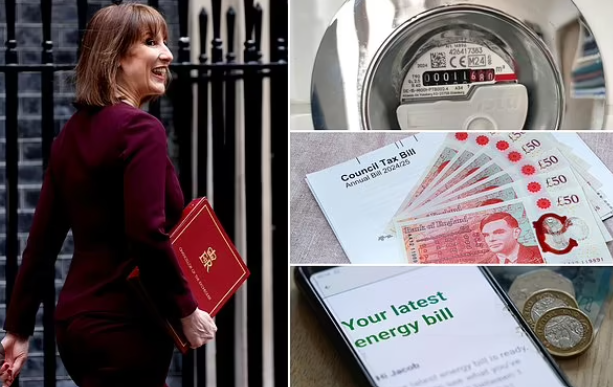‘They’re making April Fools of us’: Labour’s tax raids and soaring household bills to cost families £1,000 a year more from next week_Nhy
Families face a hammering of £1,000 to their annual budgets from next week as Labour‘s tax raids and inflation-busting bill hikes come into force.
In what is being dubbed ‘awful April’, council tax, water and energy rates are all set to rise. Chancellor Rachel Reeves‘ £25 billion raid on employers’ National Insurance will also kick in, with costs being passed on in the form of lower wages and higher prices.
Exclusive analysis for the Daily Mail today lays bare the burden on households and signals a revival of the cost-of-living squeeze, blowing a hole in Labour’s promise to put more money in people’s pockets.
It also threatens to kill off the predicted meagre economic growth of 1 per cent for this year, which could force Ms Reeves to come back for more tax hikes and spending cuts.
Writing in today’s Mail, Tory leader Kemi Badenoch said: ‘It’s no surprise all these hikes are coming from April 1. Labour are taking the British public for fools.
Some of these bills will show the extent to which Labour lied to get your vote last year.’ She added: ‘This is the reality of Labour in charge: record taxes, rising unemployment, higher inflation and no growth.’
According to analysis by the Centre for Economics and Business Research (CEBR), the NI hike alone will wipe out at least £565 on average from household budgets. That is based on the Office for Budget Responsibility saying this week that around two-thirds of the raid will be passed on by firms in lower wages and higher prices.
It also estimated that council tax rises will on average cost households £90, while unprecedented hikes to water bills will add £123. This is followed by energy bills (£111), broadband (£21.99) and road tax (£5).

In what is being dubbed ‘awful April’, council tax, water and energy rates are all set to rise as part of Labour and Chancellor Rachel Reeves’ (pictured) tax raids

Families face a hammering of £1,000 to their annual budgets from next week as Labour’s tax raids and inflation-busting bill hikes come into force

In what is being dubbed ‘awful April’, council tax, water and energy rates are all set to rise
Labour’s simultaneous stamp duty raid – also announced in October – will only deepen the pain for those looking to move house, adding thousands of pounds to the cost.
Separate analysis by the Institute of Economic Affairs think-tank found that the wealthiest households could find themselves £2,729 worse off on average after capital gains tax, the levy applied to sales of second homes and shares, was also hiked in the Budget.
On Tuesday and next Sunday, hikes to road tax, employers’ National Insurance and stamp duty announced by Ms Reeves in her October Budget will kick in. They are on top of capital gains tax increases which started in October.
There will also be 5 per cent hikes to most residents’ council tax, along with crippling increases in water, energy and broadband bills after regulators gave suppliers the green light to raise prices by inflation-busting amounts.
Christopher Breen, head of economic insight at the CEBR, said: ‘Consumers continue to feel gloomy about their finances, and it’s no wonder why.
‘With costs rising and wage growth easing, we don’t expect significant imminent improvements in the consumer outlook.
‘The situation for the lowest-paid workers remains particularly critical – the rate of direct-debit failures has continued to increase recently, with the upcoming changes to welfare payments likely to further impact hundreds of thousands of people.’
IEA executive director Tom Clougherty added: ‘The tax increases coming into force in April will weigh on household budgets and undermine economic growth. British households are going to continue feeling the pinch.’
Adam Corlett, head economist at the Resolution Foundation think-tank, said: ‘Rachel Reeves’ payroll taxes are likely to take the edge off any pay rises people get, while the previous government’s tax threshold freeze will mean a greater share of those pay rises will go straight to HMRC.
‘Extra financial pressure in April comes around most years. But it’s harder to take when the economy is stagnating.’

Chancellor Rachel Reeves’ £25 billion raid on employers’ National Insurance will also kick in, with costs being passed on in the form of lower wages and higher prices

Labour’s reforms, coming after years of fiscal drag where income tax thresholds have remained frozen, mean the tax burden is set to reach its highest level in history
In the October Budget, Ms Reeves hiked employers’ National Insurance contributions from 13.8 per cent to 15 per cent. The employee salary threshold at which firms start paying it was lowered from £9,100 a year to £5,000. She also nearly doubled capital gains tax for basic-rate taxpayers from 10 per to 18 per cent.
Meanwhile, the tax-free stamp duty allowance was slashed from £425,000 to £300,000 for first-time buyers and £250,000 to £125,000 for others.
The reforms, coming after years of fiscal drag where income tax thresholds have remained frozen, mean the tax burden is set to reach its highest level in history.
Most councils in England also plan to raise council tax bills by 4.99 per cent from next week – the maximum amount permitted by the Government without seeking permission. It will increase the typical Band D bill from £2,171 to £2,280.
Some councils have been given permission to impose hikes of up to 10 per cent.
Energy bills for millions of households will rise by 6.4 per cent from April 1, when Ofgem increases its price cap for a third consecutive quarter.
The water bill increases are the largest rise since the industry was privatised in 1989 after regulator Ofwat allowed companies to raise average bills by 36 per cent. This was to help finance a £104 billion infrastructure upgrade to the creaking sector.
Some firms have been allowed significantly higher increases. Southern Water customers will face a 53 per cent increase and Severn Trent households will see their bills rise by 47 per cent, before inflation.

Writing in today’s Mail, Tory leader Kemi Badenoch (pictured) said: ‘It’s no surprise all these hikes are coming from April 1. Labour are taking the British public for fools’
For those on inflation-linked contracts, which is most households, broadband prices will rise by an average of £21.99 a year from next week, with some newer plans seeing increases of up to £42 a year, according to consumer group Uswitch.
The standard rate of road tax – also known as vehicle excise duty – for cars registered after April 2017 will also rise to £195 from April 1, an increase of £5.
But some new cars will see their road tax double, with the most polluting vehicles facing a staggering hike of £2,745 to use the road.
Labour pledged not to hike NI in its election manifesto, sparking accusations that next week’s increase broke its pledge.
A Treasury spokesman said: ‘We are protecting payslips for working people by keeping our promise to not raise the basic, higher or additional rates of income tax, employee National Insurance or VAT.’



